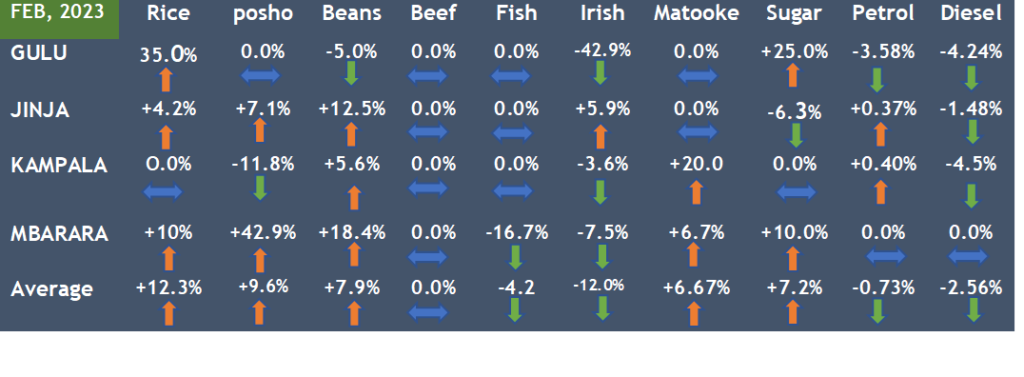Neofacts conducted a Food Pricing Study in January 2023, whose findings indicated a general decline in the price within the same month for foods such as rice, posho, beans, fish, Irish, and sugar, while for Matooke price rose. In the same month, the price of beef remained stable while Fuel prices also declined. This formed a baseline on which the result for the month of February is measured.
This food pricing study employs a Longitudinal Research Design which allows researchers to collect data over an extended period of time (months or years) to observe changes or developments in prices. The goal is to track the same individuals or groups and study changes in variables of interest such as behaviour or, attitudes, and price. Consequently, the study continues to track food prices in the major four cities across the four major regions of Uganda; the Cities being studied are; Mbarara, Kampala, Jinja and Gulu.
This study aimed to gather data and analyze food prices in these cities/regions and understand the factors that influence prices. The data is tracked on a monthly basis and captures trends in the pricing of major foodstuffs. The intention is that the information provided will be of value to various stakeholders, including governments, food retailers, farmers, consumers, and other organizations. They can utilize the data to make well-informed decisions related to food policy, security, pricing strategies and procurement. By having access to this knowledge, these stakeholders can take appropriate steps to ensure that the food system is reliable and sustainable. Food retailers can also benefit by understanding market trends, and adjust their pricing strategies accordingly. Ultimately, the aim is to create more reliable and transparent data for effective decision-making by different stakeholders.
SUMMARY OF FINDINGS
Summary showing percentage change in prices for the month of February 2023.

Based on the data collected from retailers in four major cities in Uganda, namely Gulu, Jinja, Kampala, and Mbarara, during the month of February 2023, it was observed that most foodstuffs experienced a notable increase in price as compared to findings of January 2023. However, it is noteworthy that some food items such as beef, fish, and Irish did not experience a price increase during this period.
Specifically, the price of rice increased by 12.3%, indicating a substantial rise in demand for this staple food. Additionally, posho, which is also a popular staple food in Uganda, experienced an increase in price by 9.6%. The price of beans also increased by 7.9%, while the cost of matooke, which is widely consumed in Uganda, rose by 6.67%. Sugar, a sweetener commonly used in many households, also experienced an increase in price by 7.2%.
On the other hand, the price of beef remained relatively stable, which may be attributed to consistent supply levels. In contrast, the price of fish decreased by -4.2%, mainly due to low demand in Mbarara. The price of Irish, decreased by -12.0%, indicating a decrease in demand for this food item.
Interestingly, fuel prices continued to decline during this period, with petrol decreasing by -0.73% and diesel by -2.56%. This trend may be attributed to global supply and demand dynamics in the oil market.
The increase in food prices, particularly for posho, beans, and rice, has been attributed to the reopening of schools, which has resulted in increased demand for these staple foods. As schools resumed their operations early in February 2023, the demand for foodstuffs increased, leading to a rise in prices. This increase in demand is primarily due to the fact that schools provide meals to their students, thus leading to an increase in the consumption of foodstuffs.
In conclusion, the data collected from the retailers in the four cities indicate that food prices have increased in February as compared to January 2023, with some exceptions such as beef, fish, and Irish. The rise in food prices is attributed to increased demand resulting from the reopening of schools, while the decrease in fuel prices may be due to global market dynamics.
Look for a detailed report from our publication on this website.
2 Comments
Well done #neofacts
I wanted to thank you for this wonderful read!! I certainly enjoyed every little bit of it. I have you saved as a favorite to check out new stuff you postÖ